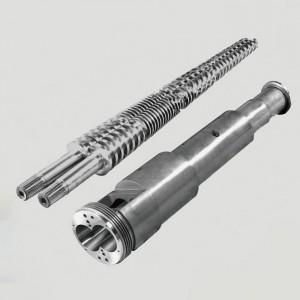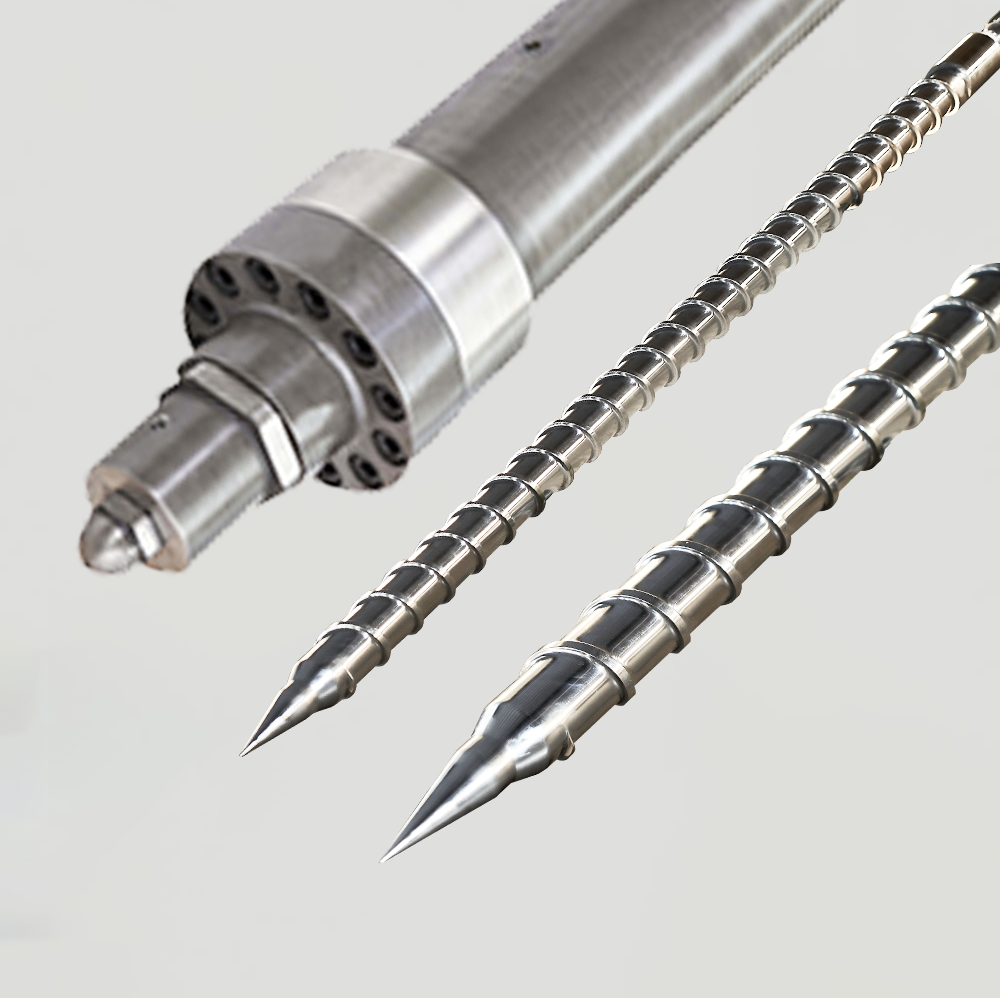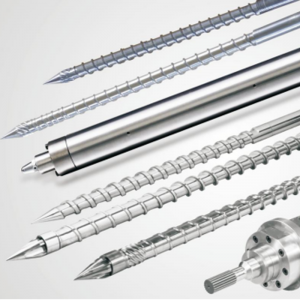
Choosing the right plastic injection molding screw barrel is crucial for optimal performance. Using high-quality materials, such as those found in a bimetallic injection screw and barrel, significantly reduces defects by up to 4.75%. Precision engineering in a screw injection machine ensures consistent product quality. This results in fewer issues and improved outcomes with every use of the plastic injection screw barrel.
Key Qualities of a High-Quality Plastic Injection Molding Screw Barrel

Material Quality and Durability
A high-quality Plastic Injection molding screw barrel starts with strong materials. Most manufacturers use advanced alloys or bimetallic designs. These materials help the screw barrel last longer, even when working with tough plastics or high temperatures. Nickel-based alloys and hardened steel are popular choices because they resist wear and corrosion. Many companies add special liners or coatings to the barrel, which makes it even more durable.
- 85% of injection molding problems come from poor screw barrels.
- Using the right materials and design can make the screw barrel last much longer.
- Bimetallic barrels lower maintenance costs and keep machines running smoothly.
Tip: Always check if the screw barrel has a wear-resistant liner or coating. This small detail can save a lot of money over time.
Precision and Tolerances
Precision matters a lot in injection molding. The screw and barrel must fit together perfectly. If the fit is off, the plastic may leak or not melt evenly. Tight tolerances help keep the process stable and the final parts accurate. For example, a screw with a 2-inch diameter should have an outer diameter tolerance of ±0.002 inches. The barrel’s internal diameter should match this level of precision.
| Measurement Aspect | Standard Tolerance | Example for 2-inch Diameter Screw/Barrel |
|---|---|---|
| Screw Outer Diameter | ±0.001 inches per inch of diameter | ±0.002 inches |
| Screw Flight Clearance | 0.004 to 0.006 inches per inch of diameter | 0.008 to 0.012 inches |
| Barrel Internal Diameter | ±0.001 inches per inch of diameter | ±0.002 inches |
Machines that keep these tight tolerances produce better parts with fewer defects. Regular maintenance and calibration help keep everything within these limits.
Design Features
The design of a Plastic Injection molding screw barrel affects how well it melts and mixes plastic. Modern barrels have special zones for feeding, compressing, and metering the plastic. Some designs use barrier screws or melt-uniformity screws to improve mixing and reduce dead spots where plastic can burn or degrade.
- Melt-uniformity screws help avoid problems like warping, weak weld lines, or short shots.
- Advanced designs can cut cycle times almost in half, making production faster and more efficient.
- Smart sensors and control systems allow for real-time monitoring and adjustments.
Note: Design innovations like conformal cooling channels or rapid heat cycle molding can also improve surface quality and reduce warping.
Compatibility with Plastic Types
A good Plastic Injection molding screw barrel works with many types of plastics. General-purpose screws handle common materials like polyethylene, polypropylene, and polystyrene. Some barrels are made for special plastics, such as nylon or PVC, which need careful temperature and moisture control. The screw’s length, compression ratio, and channel depth can be adjusted to match the plastic being used.
- Specialized screws help prevent problems like burning or uneven melting.
- Barrels made from nitriding steels offer high hardness and work well with different plastics.
- The right screw design improves mixing and keeps the plastic’s properties strong.
Did you know? Some machines can switch between different plastics just by changing the screw or adjusting the settings.
Maintenance and Longevity
Keeping a Plastic Injection molding screw barrel in good shape is important for long-term use. Regular cleaning, lubrication, and inspections help prevent breakdowns. Many companies use sensors and smart systems to track wear and predict when maintenance is needed. This approach reduces downtime and keeps production running smoothly.
- Preventive maintenance can cut equipment failure risk by up to 60%.
- Condition-based maintenance uses real-time data to spot problems early.
- Cleaning and purging remove contaminants that can damage the screw barrel.
Pro Tip: Recording temperature and wear data helps spot issues before they become big problems, making maintenance easier and extending the life of the screw barrel.
Performance Indicators
Several metrics show how well a Plastic Injection molding screw barrel works. Real-time monitoring of barrel temperature and screw speed helps prevent overheating and keeps the plastic from degrading. Consistent shot size, stable screw position, and smooth velocity control all point to a high-performing screw barrel.
| Performance Metric | Why It Matters |
|---|---|
| No screw drift at shot size | Keeps shot size steady, reducing defects. |
| Shot-size consistency | Ensures each part is the same size and weight. |
| Position cutoff consistency | Helps the screw switch stages at the right time for repeatable results. |
| Velocity linearity | Maintains smooth flow, which improves part quality. |
| Delta pressure for velocity control | Keeps injection speed steady, making products more consistent. |
| Switchover response | Ensures the machine switches from injection to packing at the right moment, protecting part shape. |
Tracking these indicators helps operators spot problems early and keep the process running at its best. Many modern machines use PLCs and IoT devices to collect and analyze this data, making it easier to maintain high performance.
How to Evaluate and Choose the Right Plastic Injection Molding Screw Barrel

Assessing Manufacturer Reputation and Certifications
A strong manufacturer reputation gives buyers peace of mind. Many top companies hold certifications like ISO 9001 for quality management and ISO 14001 for environmental standards. Industry-specific certifications, such as ISO 13485 for medical or IATF 16949 for automotive, show a commitment to high standards. Quality assurance systems use tools like CMM machines and SPC tracking to prevent defects and ensure traceability.
Buyers can also look at performance histories. Metrics such as defect rates, quality yields, and customer reviews help show how reliable a manufacturer is. Many companies use quality scorecards and internal audits to keep their standards high.
Tip: Ask for proof of certifications and check customer feedback before making a decision.
Checking for Customization and Technical Support
Every molding process is different. Customization lets buyers match the screw barrel to their specific plastic material and process needs. For example, screws designed for PVC use low shear to prevent overheating, while PET screws focus on temperature sensitivity. Adjustments like cooling holes or special coatings can improve efficiency and product quality.
Technical support matters, too. Companies that offer help with setup, troubleshooting, and predictive maintenance can reduce downtime and save money. Some even use smart systems to monitor equipment and alert users to problems before they cause delays.
Comparing Cost vs. Value
The best choice is not always the cheapest. Advanced screw barrels, such as bimetal types, cost more upfront but last longer and need less maintenance. Their strong design and smart features, like sensors for predictive maintenance, help reduce downtime and energy use.
A simple table can help compare options:
| Feature | Standard Barrel | Advanced Barrel |
|---|---|---|
| Upfront Cost | Lower | Higher |
| Lifespan | Shorter | Longer |
| Maintenance Frequency | More Often | Less Often |
| Energy Efficiency | Standard | Improved |
Choosing a high-quality Plastic Injection molding screw barrel often leads to long-term savings and better results.
A Plastic Injection molding screw barrel needs strong materials, tight tolerances, and smart design. Good temperature control and regular maintenance keep the process smooth. Most barrels use cast steel or special alloys to handle high heat and pressure. Buyers should check for easy cleaning, reliable performance, and the right fit for their plastics.
Quick Checklist for Buyers:
- Strong, wear-resistant materials
- Precise screw and barrel fit
- Advanced design for mixing and melting
- Good temperature control
- Easy maintenance
- Proven performance in real production
Investing in quality means fewer defects, steady production, and long-term savings.
FAQ
What materials work best for a screw barrel?
Nickel-based alloys and bimetallic steel offer strong wear resistance. These materials help the screw barrel last longer, even with tough plastics.
How often should someone clean a screw barrel?
Most operators clean the screw barrel after every production run. Regular cleaning keeps the barrel in good shape and prevents contamination.
Can one screw barrel fit all types of plastics?
Not every screw barrel fits every plastic. Some barrels work best with specific materials. Always check compatibility before starting a new job.
Post time: Jun-30-2025
